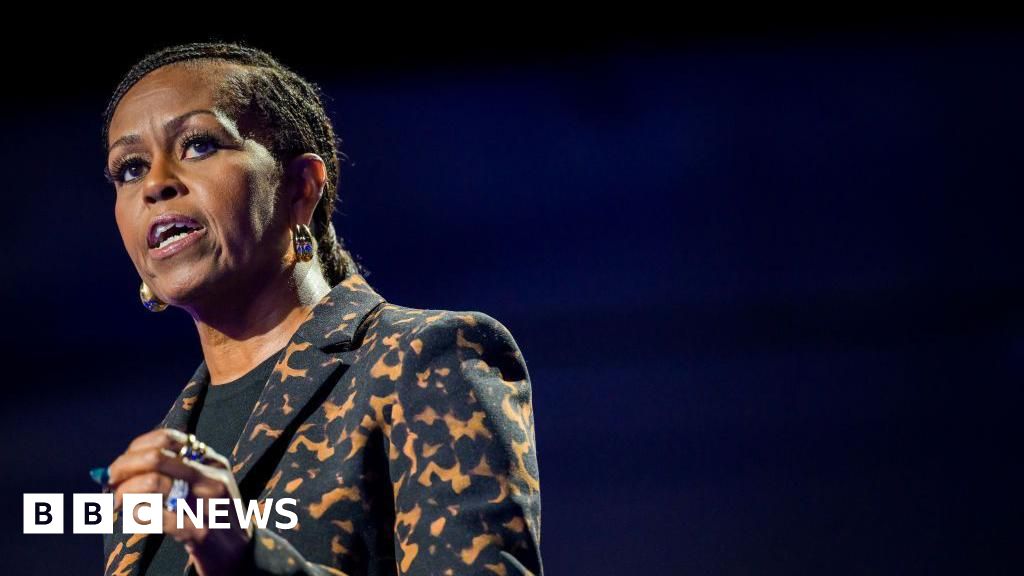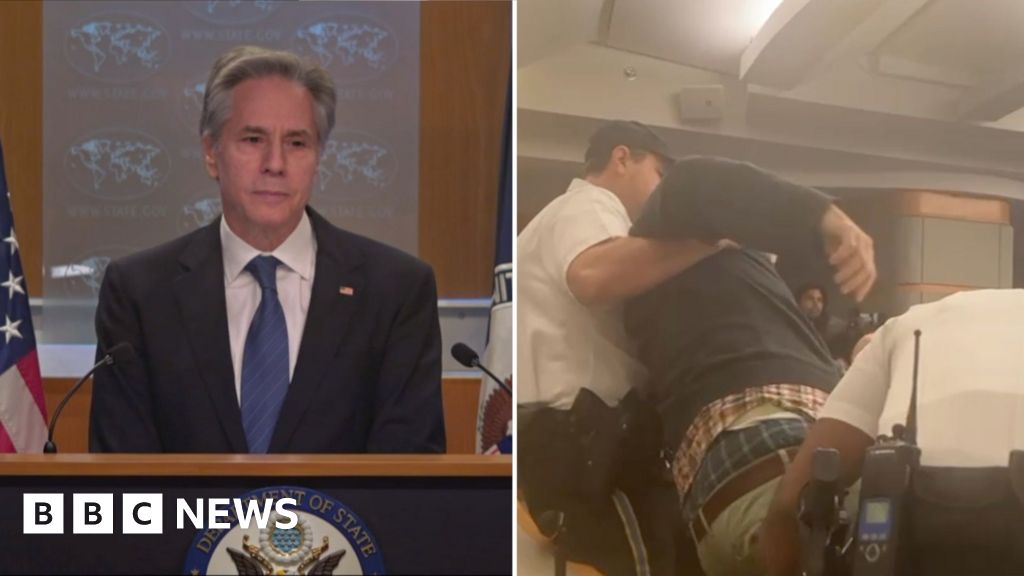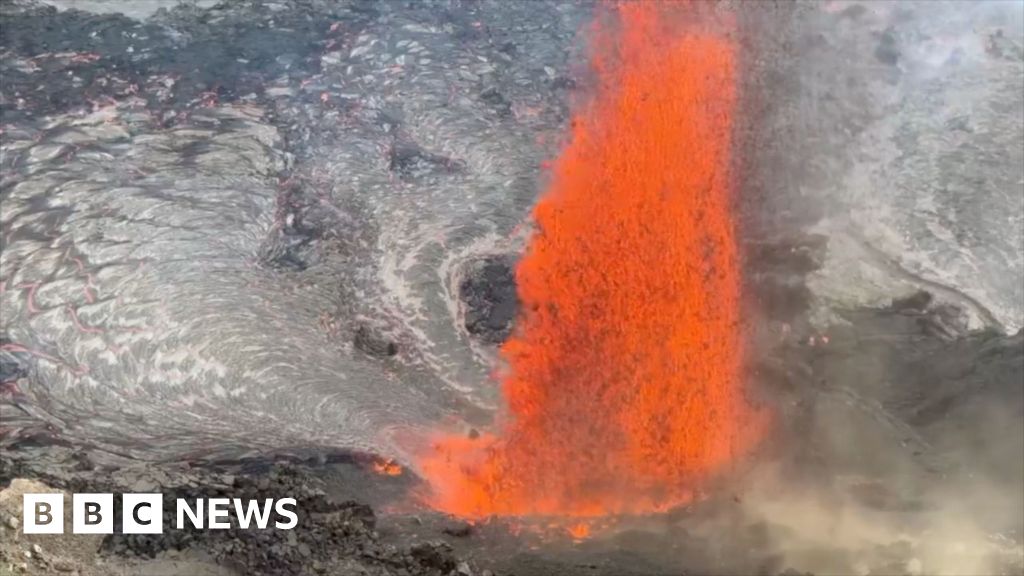ARTICLE AD BOX
How Muslims in Michigan are voting in the presidential election
At the Sahara Restaurant in Dearborn, Michigan, four Arabic language TV news channels are beaming in images of the war in Gaza and the aftermath of the recent pager and radio devices explosions in Lebanon.
The smell of cardamom-infused coffee and shawarma and falafel, and hum of friends catching up, stand in stark contrast to the images on the television screens.
Dearborn is the first Arab-majority city in the US, and it has served as a key centre for the "uncommitted" movement that is opposed to the Biden administration's policy toward the Middle East.
Because they are in Michigan - a key Midwestern swing state that Joe Biden won by fewer than three points in 2020 - Dearborn voters, like those who frequent the Sahara Restaurant, could decide Kamala Harris's political future.
Sam Hammoud, whose family has run the Sahara Restaurant in Dearborn for the past 30 years, said that taxes and inflation have negatively affected his business - but it's not what is motivating his vote. He is currently an undecided voter.
“It’s about the situation in our homelands,” he said.
“We need a ceasefire. There is no ceasefire. We have no more words,” he added.
Mr Hammoud's feelings are shared by many here, and the Arab-American community has been sounding the alarm bell to Democrats for months, warning the party that it’s loyal support could not be automatically counted on this election.


Soujoud Hamade, a longtime Democrat, is voting for a third-party candidate this election
In a statement this week, the Uncommitted Movement - which is made up of traditionally Democratic members - said it could not endorse Harris because of her “unwillingness to shift on unconditional weapons policy or to even make a clear campaign statement in support of upholding existing US and international human rights law”.
Soujoud Hamade is a lawyer in the Detroit suburb and president of the Michigan Chapter of the Arab American Bar Association.
She canvassed for the Democratic Party in past elections, and feels her work helped get President Joe Biden elected in 2020. He won Michigan with a margin of just 2.78%.
This time around, Ms Hamade is voting for Green Party candidate Jill Stein.
She is not alone. An August poll from the Council on American-Islamic Relations indicates that in Michigan, 40% of Muslim voters back Stein, 18% preferred Republican Donald Trump - and only 12% supported Harris - suggesting a significant shift from past strong support for Democrats.
Ms Hamade said the "traditionally" Democratic Arab-American voters in Michigan “cannot stomach the thought of voting for someone who's directly contributing to the death and destruction of our home country and of our relatives overseas”.
Harris welcoming the endorsement of former Republican Vice-President Dick Cheney, who is publicly supporting Harris over his concern Trump poses a threat to the country, was particuarly troubling for the Michigan lawyer.
She said Cheney’s involvement in the US invasion of Iraq in 2003 makes him an unwanted bedfellow for her community.
“It's baffling to me as an American, to now see the direction that the party is going, it's disheartening," she said.
"These aren't the values that we as Democrats stood for. We were not the party of war”.
Packed full of cafes, restaurants and independently-owned stores, Dearborn enjoys a thriving small business economy - as well as a strong community that is deeply affected by the conflict in the Middle East.
Dr Maisa Hider-Beidoun, who owns a chain of pharmacies and medical centres in the region, said she is lifelong Democrat who does not know if she can support Harris.
Her community has been placed in "a moral dilemma”.
“We are good Americas, we are good tax-paying, law-abiding citizens, but our money is being funneled overseas and killing people that are actually physically related to us," she said.
In February's Democratic primary in Michigan, over 100,000 people in this community declaring themselves "uncommitted" in protest of the Biden-Harris administration's policy toward Gaza.
The community says it has sought meetings with the White House and have asked the vice-president to outline how her approach to Israel might differ from Biden's.
While the Uncommitted Movement criticised Harris, it also opposes Trump, whose “agenda includes plans to accelerate the killing in Gaza while intensifying the suppression of anti-war organising”, it says.
The organisation did not recommend its members vote for a third-party candidate like Stein.
Dr Mona Mawari, a pharmacist and a community organiser who worked on the uncommitted campaign, told the BBC she is still struggling to decide how to vote in November - “a really hard decision”.
Harris is “maybe a little more empathetic with her words” than Biden regarding what Ms Mawari describes as “genocide” in Gaza, but she finds is hard to support her.
Harris has said she is aligned with Biden on US support for Israel though she has spoken more about the scale of the human suffering in Gaza.
Said Ms Mawari: “The community is really upset, and they're very hyper-aware that lip service is just lip service, and without any actions they can't vote for her".


More on the US election
The situation in Lebanon has also sharpened fears about an escalation in the regional conflict and, for this Arab-American community, what it means for their families there.
Faye Nemer came to the US when she was 10, fleeing Lebanon because of the political instability and violence, and she is now the CEO of the Middle East North American Arab Chamber of Commerce.
Before her family left Lebanon, she says they were “living as refugees” in their own country, moving between “abandoned office buildings”.
So she looks at the situation in Gaza - where more than a million people have been displaced - through a different lens, particularly the experience of children.
Her sister and much of her extended family are still in Lebanon.
“It's difficult to conduct your day-to-day without that being top of mind,” she said.
A lifelong Democrat, she has also not made up her mind on how - or if - she will vote, and is also weighing voting for a third-party candidate.
Some 3.5 million Americans claimed Middle-Eastern descent in the 2020 Census -around 1% of the population, though many are concentrated in battleground states like Michigan and Wisconsin.
Ms Mawari said that the uncommitted movement doesn't want people to feel apathetic and not cast a ballot, but to use their vote in whichever way they believe is right.
"Sitting this one out is is not an option. It's not an answer to what's going on,” she said.


North America correspondent Anthony Zurcher makes sense of the race for the White House in his weekly US Election Unspun newsletter. Readers in the UK can sign up here. Those outside the UK can sign up here.

 3 months ago
23
3 months ago
23








 English (US) ·
English (US) ·